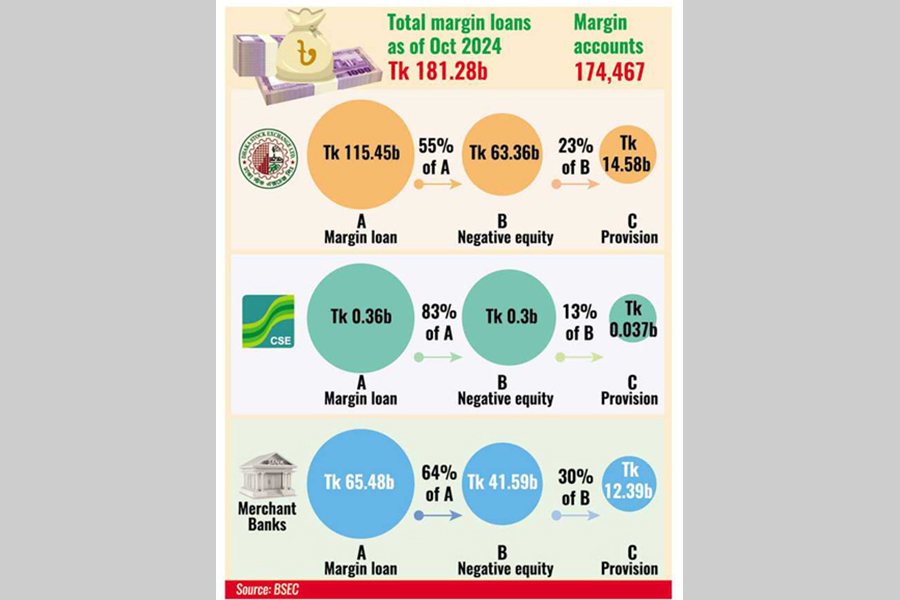
Published :
Updated :

The securities regulator has sought the finance ministry's intervention for a "quick solution" to negative equity that has been hindering the market's growth for more than a decade.
The outstanding negative equity against margin loans taken for investments in the equity market stood at Tk 105.2 billion as of October last year. In this, the loans taken were worth Tk 78.6 billion and interest on that amounted to Tk 26.6 billion.
The Dhaka and Chittagong bourses and merchant banks, however, kept only Tk 27 billion in provision.
The worrisome margin loans were not as high as it looks now 15 years back after the 2010 market debacle. But it has been let grow bigger and bigger with the hope that the market would expand and investors would be able to clear their debts.
Instead, the problem intensified, stifling the growth of the market.
Market operators say margin loans deepened financial distress and weakened intermediaries of the stock market and banks.
To address this lingering issue, the Bangladesh Securities and Exchange Commission (BSEC) has sought the intervention of the Financial Institutions Division (FID) under the Ministry of Finance.
"The commission has requested support and guidance for a permanent solution to the growing negative equity in the market," said a BSEC official, requesting not to be named.
A letter has recently been sent to the Secretary of the FID, requesting that a joint meeting be held with all brokerage houses and merchant banks to find out a way, he added.
The BSEC explained in the letter that the accumulation of negative equity stemmed from the market debacle in 2010 and subsequent irregularities in the following years.
"These losses have been carried forward in investor accounts for years, worsening the problem. Despite various initiatives and ongoing discussion with market intermediaries, the issue remains unresolved," reads the BSEC letter.
The letter also mentioned that the BSEC had previously instructed market intermediaries to keep provision against such unrecovered losses within January 31 this year.
The deadline is already over.
"The commission has to give us a time extension because negative equity is a result of its direct intervention. It didn't allow us to sell stocks in margin accounts after the 2010 market crash to prevent further fall of the index. And then the floor price was another regulatory intervention that barred selling of stocks," said Saiful Islam, president of the DSE Brokers Association of Bangladesh.
In December last year, the DSE Brokers Association, however, submitted a proposal for an extension of the deadline until 2030. This was the sixth time extension proposal since 2016. The BSEC has not extended the latest deadline yet.
The BSEC official said brokerage houses and merchant banks had failed to keep provisions despite multiple extensions. In this context, the BSEC looks to the FID for a solution to the problem.
Emergence of negative equity
Before the 2010-11 stock market crash, lenders disbursed margin loans aggressively boosting liquidity in the market.
Insider said some lenders had disbursed margin loans beyond the regulatory limit. They also provided margin loans to pull specific stocks on the bourses.
Stock brokers and merchant banks provide margin loans from funds received from parent companies, most of which are banks.
The market shot up in 2010, owing to margin loans, and then it burst, rendering massive erosion of assets' value. That led to negative equity piling up.
As per the stipulated rules, there was no scope of negative equity as the lenders were supposed to sell the assets in margin accounts before their worth went below the amount of money lent.
But after the market collapsed, the regulator verbally instructed lenders not to sell stocks in margin accounts on the pretext of protecting investors' interests, assuring them that the market would soon rebound, but that did not happen.
Over time, negative equity ballooned and the restrictions proved to be nothing but futile attempts to protect lenders and clients. Meanwhile, the hope that margin accounts would recover the loss eventually has diminished.
farhan.fardaus@gmail.com


 For all latest news, follow The Financial Express Google News channel.
For all latest news, follow The Financial Express Google News channel.